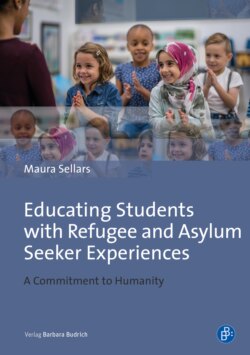Читать книгу Educating Students with Refugee and Asylum Seeker Experiences - Maura Sellars - Страница 14
На сайте Литреса книга снята с продажи.
Postformal Education
ОглавлениеGidley (2016) in her exploration of the political, socio- cultural, economic and historical impacts on educational theory and practices, returned to the notion of pedagogical love as the first of her core pedagogical values for her Postformal education framework, designed to effect radial change in the ways in which educational practice is conceived and conducted. She strongly stated that, ‘this is the time to [13] think deeply, feel intensely and have the courage to act’ (Gidley, 2016:189). She recognised what is apparent on an everyday basis to many students in schools, that pedagogical love is the most important of the many characteristics that are absent in many current educational contexts. Asserting the central role of love in all spirituality and notions of caring, Gidley denounced the purposes and practices of current neoliberal education as damaging and promoting of ‘callous values’ (2016:190); a perspective explored earlier in this chapter. She cites the inevitable consequences of socializing young people into society without any recourse to love and care. Prominent amongst these consequences are the issues of mental health and the associated lack of belonging, connectedness and community, all of which are already significant concerns for students with refugee experiences and which underpin the many psychological and social reasons for the introduction of pedagogical love.
Gidley discussed this pedagogical love in three major themes. These were higher purpose, dialogical reasoning and integration. These are each unpacked in terms of Postformal Reasoning Qualities that relate to Spiritual Development, Contemplation and Compassion (Gidley, 2016). The higher purpose relates to the need to restrict self-interest, become less egocentric and be open to be inspired to a life purpose that relates contributing towards improving the life of others. This is a direct challenge to the egocentric, producer- consumer identity that neoliberal education agenda support in their various manifestations. For many individuals, self -interest does not need the encouragement of competition, success at the expense of others, indifference and the misappropriation of blame that is attributed to those in less fortunate circumstances; all of which are evidenced in the application of economic policy to the human interactions of education. The second reasoning quality relates to dialogical reasoning, which, unlike formal thinking, does not result in winners and losers. It is an interactive dialogue in which the views and opinions of others are respected and considered in the process of discovering decision- making in which all parties can experience successful outcomes. The final Postformal reasoning quality invited a more holistic view of what is considered educative in education systems. The discipline specific, specialized and fragmented ways of teaching and learning prevent an integrated approach which acknowledges the ways in which disciplines inform each other (see, for example, Sellars, 2018) and which compartmentalize knowledge, skills, concepts and capacities.
Not only does this inhibit students’ capacities and opportunities to synthesize their learning and maximize their competencies, it does not reflect the authentic purpose of learning, which is to enhance individuals’ lives and empower them to create the prospect of change and improvement. Gidley envisaged this integrated approach as more than content integration and connectedness. In describing the [14] Postformal reasoning quality she emphasised ‘a systems approach’ (Gidley, 2016) which implies the integration of all the components of a system. In the case of education, it would be evidenced as students and teachers working together to implement curriculum and evaluation, including on assessment. Ideally, students and teachers would be working together in a dialogical process to develop curriculum and evaluative procedures. This process would not have as its focus the conquering of an elitist, narrow selection of required knowledge, but the knowledge, skills and conceptual learning that would inform, empower and motivate students to engage with their relative strengths (see, for example, Sellars, 2008) and achieve the learning they value. The implications of this understanding of pedagogical love for students with refugee experiences and the interpolation of the remaining three pedagogical values developed by Gidley will be discussed in the detail of the following chapters as the focus of authentically educating these groups of young people and children is increasingly extrapolated. These theories of teaching as an act of love have the potential to make a difference as evidenced by Freire, Noddings and in Gidley’s radical reconceptualising of education. They are each a human response to injustice and disempowerment created by self-interest at powerful levels in society. As the statistics show, the groups of people who have endured much of the suffering as the results of this self-interest and hegemony are those with refugee experiences, particularly the children and young people.
